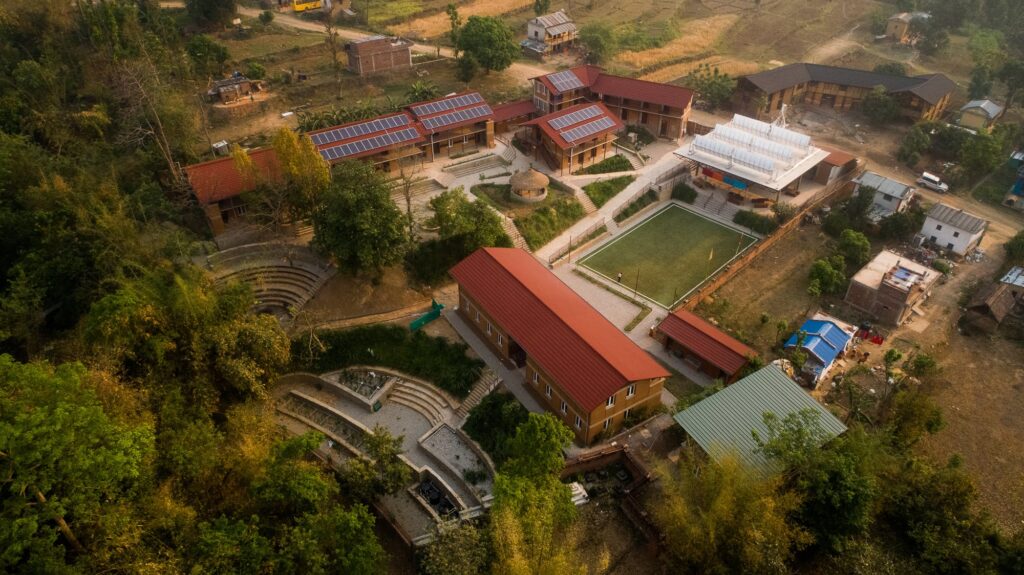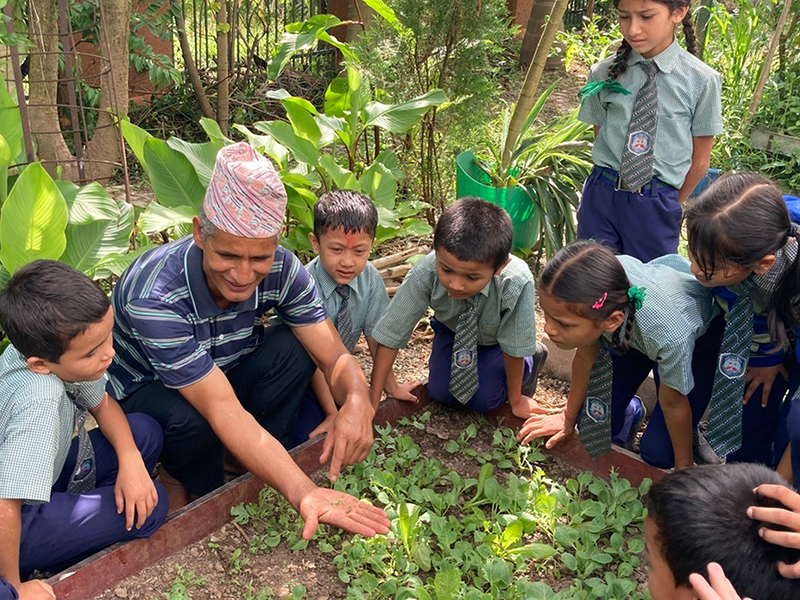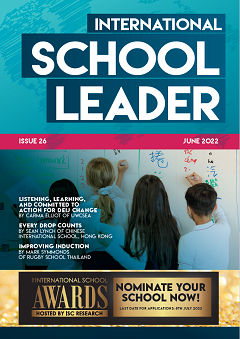In June 2024, we wrote about Kopila Valley School’s healthy food and farming program. Here is a broader look at our environmental education and school culture.
Sustainability is one of our core foundations at Kopila Valley School; we believe that students can and should learn how to live in harmony with the environment and with care for the community. Sustainable living is deeply rooted in the knowledge of place and one’s surroundings. Therefore, we have focused on place-based education as an important approach to promoting this vital subject.
Our school’s co-founders set out a clear vision to end cycles of poverty by promoting the wellbeing of each child and the community symbiotically. This materialised through the generous support of donors, continued support from management, and collaborative efforts from various cross-departmental units both within and outside the school. The support from the local community and the government are key assets to the success of our sustainability initiatives.
Building a sustainable school
To create a sustainable school ecology and culture, we have designed our curriculum and our physical campus mindfully, with the environment at the forefront, earning our nickname as ‘The Greenest School in Nepal.’ Our school campus is built using rammed earth walls for insulation, powered entirely by solar energy, with recycled rainwater used for handwashing, cleaning, toilet flushing, and filtered for drinking.
Moreover, we believe that school curricula should provide opportunities to study natural systems in a way that reflects how we experience them in daily life. To achieve this, integrated sessions on Education for Sustainability (EfS) are a major focus at Kopila. Each EfS session is based on at least one big idea of sustainability, relating that with the topics of different class subjects. Classes of all subject areas integrate environmental topics and engage students with an in-depth exploration of such. For example, studies involve measuring weather patterns, air quality, gardening, and community surveys about waste management. Lower grade students have opportunities for nature immersion, and upper grade students are slowly beginning to explore the challenges in their community and how they, the students, can solve them.
Additionally, through our extracurricular clubs, we teach life skills to ensure that students grow as independent and eco-conscious citizens. One example is our ‘Sustainability Ambassadors Club,’ where students from grade 6-12 come together to explore real-world problems and develop solutions. Additionally, members of the ‘Birding Club’ are exploring the bird diversity around the region, and the ‘DIY (Do-It-Yourself) Club’ students reuse and upcycle waste materials.
Finding time for nature immersion can be challenging in a context where we need to follow the rigorous curriculum set by the government. Nonetheless, we have learned that including nature immersion in the school schedule improves students’ environmental and cultural understanding, as well as their progress towards set learning outcomes.

Photo: Kopila Valley School
Community impact
Sustainability carries into each of our organisation’s practices and community outreach initiatives. With procurement and purchasing, we prioritise local goods and assess the sustainability of the products we buy (e.g. school uniforms, stationery, furniture). Where possible, we promote the growth of sustainable and profitable businesses – such as kitchens, farms, and bakeries – that produce products for our organisation and wider community (e.g. mushrooms and honey).
We frequently host summits, immersive learning experiences, workshops, and campus tours to inspire and lead regional and national conversations about community development, education, sustainability, and child safety and protection. After visiting our events, NGOs and social service agencies report that they have shifted their strategies to address generational poverty in their own organisations and communities. We also share our knowledge by opening our campus as a teaching centre for organic farming methods – a practice which led to the co-creation of a Participatory Guarantee System (PGS) cooperative group, as well as farmers’ market opportunities for the community.
Collaborating with local partners has been vital for connecting our curriculum to relevant, real-world issues, and we are working to establish and invest in more of these long-term relationships.
Impact for the future
Our goal is to develop quality education and therefore inspire well-informed citizens. We measure our impact through the climate resilience and stewardship actions demonstrated by our students. The school’s 257 graduates have all participated in climate action initiatives during their school years and/or after graduation.
We are pleased and proud that Kopila Valley students are becoming problem solvers. Long-term, our vision is for students to integrate healthy food and sustainability values into all areas of their lives, have opportunities to learn about and enter green/sustainability careers fields, and spread sustainable practices in their future adult lives and with their families and communities.
We are inspiring the broader community to embrace the values of sustainability through collaboration with students, staff, caregivers, community members, businesses, local nonprofits, and different tiers of government, with a major focus on the local level. We are also working to build a school support and mentoring network locally with public schools so that they may replicate our model, thereby improving education for children in our region and, eventually, across Nepal.
However, there is still work to be done. We will continue to strengthen our school curriculum by building on local knowledge and empowering local people, as we want the community to create and interact flexibly with the school.
“We believe that school curricula should provide opportunities to study natural systems in a way that reflects how we experience them in daily life.”
We dream of more sustainable schools
Every day, we practice our values. Every day, we see students learning and applying sustainability practices in their lives. We are sharing our education model with the world because we see the depth of the impact it creates, and we hope to inspire others to implement a similar focus on sustainability into their curriculum. Here are some key tips for doing so:
- Invest for the long term. Start with small changes, looking at the solutions that are relevant to your area.
- Understand your community context. Develop relationships with key community stakeholders and include them in programmatic discussions. Those who hold the collective and traditional knowledge of the region will be invaluable advisors when creating a place-based learning environment.
- Move forward in collaboration. An approach that integrates both the community and the values it embodies helps to ensure that ethics like earth–care, people–care, and fair share can be contextualised for the setting and environment of each school.


Sunita Bhandari is the Sustainability Coordinator for Kopila programs in Surkhet, Nepal. She works to operate an environmentally friendly school campus and integrate sustainability in the teaching and learning processes. You can connect with her on LinkedIn.
Rajen Karki is the Principal of Kopila Valley School, providing oversight for the curriculum, operations, and integration with sustainability values. You can connect with him on LinkedIn.



